On Wednesday, January 11th, I was in a very upbeat mood. Over the weekend, I’d returned from a monumental week: Joe Satriani’s G4 Experience in Lake Las Vegas. To be a featured teacher/speaker/player among such esteemed company – it included names like Frampton, Morse, Lukather and too many wonderful players of multiple generations to list – was beyond humbling. It was headed by my one time local guitar sensei turned household name, Joe. All involved seemed to agree: 2023 was off to a great start, especially guitar-wise.
Still high from the six-string extravaganza, I enthusiastically sat down to gather a few pics from the week before to share online. But first, a quick glance at Twitter. That’s when I saw the following tweet from a music blog and online record store, Brooklyn Vegan:
“Jeff Beck dies at 78.”
“This can’t be!” I thought. Jeff Beck seemed so alive and well. He was in the middle of an album cycle. New tour dates were recently announced. In a bizarre twist, he’d been getting more mainstream attention than ever (thanks to a movie star pal’s personal drama). Clearly this had to be a hoax...No one else was reporting on it.
Alas… Brooklyn Vegan was simply ahead of the curve and lightning fast with their turnaround. Within minutes: Notifications from Rolling Stone, The New York Times, CNN & more confirming the shocking news. There was Jeff Beck’s own official Twitter account with a statement. Next, a flurry of texts from fellow musicians. It was real.
In an instant, 2023 had been hit with the darkest news possible for guitar enthusiasts.
The next day felt like a National Day of Mourning, as though we had lost a Pope, President or Monarch. However, while all those types have their detractors, Jeff Beck is universally appreciated and admired. If any musician deserves to lie in state, it is Jeff Beck.
It is difficult to describe Jeff Beck’s style in words but one observation is that he managed to capture the nuances of a slide player even with bare fingers. Certain early works clearly do have slide – for example, “All Shook Up” (Beck Ola), “I Can’t Give Back The Love I Feel For You” (Jeff Beck Group).
Yet as time went on, he increasingly captured the same emotive feel, minus the slide. Once he switched permanently to a Stratocaster in the ‘70s, the tremolo became a tool similar to how he’d used slide earlier on. Right up until the end, he continued to develop this technique, always taking it somewhere new. His whammy-bar use was purely expressive, never excessive, especially when compared to the trend in the ‘80s to play wild “dive-bombs” which tended to be a bit, for lack of a better word, bombastic.
Eventually he’d remove the pick as well. By no longer depending on slides and picks, he developed a deeper, more direct touch with the instrument. In Jeff Beck’s hands, the guitar became a biological attachment, much like the human voice. Indeed, his sound has often been compared to the nuance of vocals. This became especially clear during his back and forth interactions with singers such as Rod Stewart, Imogen Heap and Stevie Wonder.
Also worth noting: He sounded great on all types of guitars. With the Yardbirds, he was a master of the Telecaster. Then, from the early to mid 70s, he was defined by the Les Paul. Then, a Stratocaster, which he has mostly stuck with ever since.
I imagine I wasn’t the only early ‘80s preteen with a cheap guitar, a tape player and Van Halen, Ozzy and Yngwie cassettes who had this type of experience. I don’t remember who this was, or where it happened, but at some point I was given unsolicited advice by an older guitarist who said the following:
“Listen to Jeff Beck, kid.”
I admit feeling a “Get off my lawn!” vibe at first.
However, it turned out to be some of the best advice I’d ever received. Of course, we’d all heard Jeff Beck’s name but no guitar fans I knew under twenty-five at this time seemed remotely interested in him (keep in mind, this was the height of the post-Van Halen revolution). A few were downright dismissive, calling it “Freedom Rock” (based on a silly TV infomercial of the time, hawking a compilation of Woodstock-era classics). Yet it immediately became clear how much Jeff Beck had been listened to by some of my then current favorites, particularly Michael Schenker (MSG, UFO, Scorpions).
In fact, this lead to the first time I noticed my own playing causing some heads to turn at a music store. A few months later, while trying out a guitar, I decided against fumbling over the EVH, Randy Rhoads and Yngwie licks I was still struggling to learn. Instead, I quoted a few licks from the JB tune I’d been plugging away at, “Freeway Jam,” (Blow by Blow) mimicking the master’s phrasing, time and vibrato. Although there’s only one JB, I had to admit, it was starting to sound pretty good. Suddenly I had the attention of nearby staff and customers, followed by a few compliments and some much needed positive reinforcement.
Which brings up an important point: If you want to develop good vibrato, listen to Jeff Beck. If you want to play good bends, listen to Jeff Beck. Heck, if you want to play good, period, dammit….LISTEN TO JEFF BECK!
And there’s no better time to listen. Listening on my new Sony WH-1000 headphones, I can clearly hear the panning and nuance of the individual tracks like never before. Of course, nothing beats vinyl and a good turntable system. Yet for all the problems of streaming (and there are many), at this moment, it feels like an abundance of riches to be able to instantly hear any Jeff Beck album on Apple Music or other platform; from his debut with the Yardbirds to his swan song - a critically-panned collaboration with actor Johnny Depp (which to be fair, does contain some very fine Beck playing worth hearing) - to every album in between.
Jeff Beck has often been called a “guitarist’s guitarist.” This statement is both misleading and entirely accurate. On the one hand, it is undeniable. On the other hand, it implies a guitarist who mainly appeals to fellow guitar players, with the implied caveat that there is less appeal among audience members who are non-musicians. Not entirely true when it comes to Jeff Beck.
Let’s compare fellow late, great British “guitarist’s guitarist” Allan Holdsworth. Without taking anything away from Holdsworth (an undeniable all-time great), the TRUTH is this: Jeff Beck could also “wow” most guitarists in attendance at a typical Allan Holdsworth concert (baring a few speed-prioritizing shred-snobs) . Yet he would have done so while simultaneously entertaining any “civilian” (date, friend, relative) who’d reluctantly tagged along purely as a companion. As a massive Holdsworth fan, even I must admit that Allan’s polymath-like plethora of science fiction-like sounds could go over the heads of laypeople in the audience (and let’s face it, many of us musicians too).
So Jeff Beck was a “guitarist’s guitarist,” yes, but also a guitarist for everyone. It didn’t matter what type of music you were into, you could hear it there mixed into JB’s playing.
Country? There was no bigger fan of Telecaster pickers than Beck, who managed to channel the flavor of Nashville’s finest sidemen into his own unique blend.
Soul? Shades of Curtis Mayfield and Isaac Hayes abound on Jeff Beck Group’s “Rough and Ready” (1971). He’s also part of one of Motown’s most important records, Stevie Wonder’s “Talking Book.” He brought down the house by joining Wonder at the Rock and Roll Hall of Fame’s 25th Anniversary Concert, playing “Superstition”)
Jazz? Jeff Beck’s mid-70s work exists in the same space as the iconic jazz/rock/fusion ie Return to Forever and John McLaughlin’s Mahavishnu Orchestra (with whom he toured in a double bill). He shares musicians with Herbie Hancock (most recently Tal Wilkenfeld and Vinnie Colaiuta).
And let’s not even go down the rabbit hole of blues based rock’n’roll, of which JB helped laid the foundation of what was to come, first as a member of The Yardbirds and later with the earlier versions of Jeff Beck Group as well as Beck/Bogart/Appice shortly before pivoting into the pinnacle of jazz-rock-fusion instrumental music.
Of course, we cannot leave out the blues itself. The blues shone through in every solo Jeff Beck played, whether with his regular collaborations or alongside Buddy Guy, BB King and various other full time blues artists over the years, who saw him as one of their own. In fact, one of the greatest solos I’ve heard in recent memory is Jeff Beck guesting with Buddy Guy (and Keith Richards), on “Cognac.” Is this the the ‘70s? The 80’s? Try 2018.
Jeff Beck has never left my playlist. Not when I found a place as a teen in an emerging movement called “thrash metal.” Not ten years later when I took my “jazz sabbatical” to pursue a music degree at New York’s New School University. And not any time since.
Jeff Beck’s profile may not have been as high as it once was - as a frequent presence in all the latest rock and pop mags alongside contemporaries like Led Zeppelin and Rod Stewart. But to those of us less interested in what’s popular and more interested in quality, Jeff Beck has always mattered. Not just in the 1960s and ‘70s but the 2020s and every decade in between, including the shredding ‘80s when wild, over-the-top guitar playing was reaching its zenith and JB sightings were infrequent.
During this time, rumor had it that his priorities had shifted to his other passion, automobiles, while the guitar had, if you’ll pardon the pun, taken a backseat. Yet by decades end, he’d put such speculation to shame by releasing “Jeff Beck’s Guitar Shop,” as essential a JB album as they come, a reminder of who was still boss (even in the “decade of shred”) and a cover that seemed to poke fun at rumors of his full-time pivot to automotive endeavors.
Now, I have heard Jeff Beck called “The Greatest Of All Time” by quite a few whom I consider to be among the best guitarists. At the risk of misquoting, I’m not going to reveal any private conversations or hazy recollections of interviews, but I assure you, it’s been said often enough by folks qualified to know. One of my personal favorites, John McLaughlin, posted this next to a picture of JB in tribute. : “You are the greatest!”
Here’s another quote from last week by a very different type of artist, non-guitarist, but someone who has made a mark in music and is certainly qualified to weigh in:
“That night (opening for the Yardbirds), I experienced the greatest guitar player I’d ever heard. Half a century later, Jeff Beck is still the greatest guitarist, PERIOD. The greatest of all time. There will never be another Jeff Beck. Ever.” – Alice Cooper
Do I agree? Let’s put it this way. On the one hand, I believe the “Greatest Of All Time” label, especially in terms of musicians, is subjective, impossible to build a scientific consensus on and thus somewhat pointless. On the other hand – and I know I’m in good company here – it seems a very strong case can be made for Jeff Beck as, to use a popular acronym, the “G.O.A.T.” And it just may be time to reevaluate conventional logic as far as these things go.
No disrespect to the mighty Jimi Hendrix, who has been at the top of every guitar “Best of” list since 1970. Jimi’s brief output (and numerous posthumous releases) continue to have a staggering impact, for sure. Yet Jimi “flamed out” (Iggy Pop’s term), early. Most people today weren’t alive at the same time he was active. We never got to hear Jimi in concert or experience (pun not intended) a current album.
Meanwhile Jeff Beck has been a part of our lives, active and in peak form for nearly three of Jimi’s lifetimes, all the while constantly improving, as baffling as that is. No doubt, Jimi inspired JB and so many others to reach greater heights. But it helps to consider how groundbreaking Jeff Beck was back in 1965, when Jimi Hendrix was still a largely unknown hired gun. Case in point: The Yardbirds on this UK television show aimed at teens (which feels like an early prototype for Austin Powers): SHINDIG!
Quite a few folks of my generation (Gen X) will undoubtedly lobby for Edward Van Halen as G.O.A.T. He’s one of my biggest influences, period, and the reason I pursued “lead guitar.” If there is ever an electric guitar version of Mt. Rushmore, EVH undoubtedly has a spot reserved (along with Jimi and Jeff). In fact, Van Halen could have retired in 1980s and that’d still be the case.
However – and I’m sorry to have to bring this up – it can’t be ignored that EVH shares a similar parallel to his own most cited early inspiration, Eric Clapton. In other words, he emerged like a bolt of lightning straight out of the gate, completely altering the guitar game. Then after several initial years of manic acclaim, there would be less enthusiasm from fans, critics and colleagues (it’s hard not to be sympathetic to both his and Clapton’s struggles with addiction and its factor in their trajectory). He would always have legions of loyal fans and deservedly so. But when pressed, most would quietly admit they yearned to hear what had first grabbed them: EVH in his “prime.”
Jeff Beck? There was never a “prime.” He was still in his prime in 2022.
There was no evidence of the demons that befall so many music careers. No out of control, “rock’n’roll animal” behavior. No overdoses. No hotel evictions or drug addictions. No rehab, militant sobriety and relapse (lather, rinse repeat). No feuds with former colleagues, other than a partially rocky relationship with his original vocalist Rod Stewart (who’d become a superstar rumored to have a bit of an ego).
He looked like a Rolling Stone (and even launched the career of future Stone Ronnie Wood), but was never infamous like the Stones. By all accounts he was a sensitive artist and kind, considerate person. There was no typical rock’n’roll machismo – and no better proof than his elevating and sharing the spotlight with deserving female musicians, such as fellow guitarist Jennifer Batten and bass virtuosos Tal Wilkenfeld and my friend, Rhonda Smith (For those interested, here’s a clip of Rhonda and I backing the late great Alphonse Mouzon at NAMM).
One unpredictable but quite eloquent and accurate statement on Beck’s recent passing came from Gene Simmons (Kiss), telling a BBC morning show “You can’t leave this planet without experiencing the astonishing Jeff Beck.” A CNN chyron quoted Simmons imploring everyone to stop what they’re doing and listen the first two Jeff Beck Group albums. Gene is right.
I confess to only having owned one of those early Jeff Beck Group albums as a youth, but I listened often and played along. Now I’m checking out the others and more recent releases I haven’t kept up with. For those of us whose who wore out copies of “Wired,” “Blow by Blow” and “Jeff Beck’s Guitar Shop,” these early recordings are a bit of a revelation – it’s clear how much the Jeff Beck Group influenced Kiss and too many ‘70s rock bands to name. Of course, no recording compares with the experience of hearing JB live, in real time.
I thankfully did manage to catch Jeff Beck live once, in 2009 (he and I have rarely been in the same region at the same time for some inexplicable reason). It remains one of my top five concerts of all time, along with my very first rock concert (Kiss in 1979), Prince in 2004, Paul McCartney in 2017, and what turned out to be pianist Keith Jarrett’s final concert thus far: Carnegie Hall, 2017. Interestingly, this relates to one of the things I was most musically struck by during Jeff Beck’s concert.
By that time I’d been attending jazz concerts for years and had heard several generations of pianists: From McCoy Tyner to Chick Corea to Hiromi. A jazz piano concert is a unique experience, very different from a rock concert. There are moments so intimate they fill you with goosebumps hanging on the edge of your seat. Yet that’s exactly how it felt to hear Jeff Beck live – intimate like a jazz piano.
It’s not that his melodic lines or chords were full of jazz harmony (although his keyboardist, Jason Rebello, is a legit jazz pianist who added rich harmonic color to Jeff’s parts). Rather, his pitch, intonation, interaction and most of all sensitivity had a similar dynamic to a great pianist. It was no surprise to read in his obituary this week that he’d taken intensive piano lessons as a child, prior to taking up the guitar. I can think of no other “rocker” who has captured those pianistic qualities on that level.
Sometime during that concert, I found myself in the VIP section standing next to Warren Haynes (of Allman Brothers & Govt. Mule), whom I’d met before. Like me, he was a lifelong Jeff Beck fanatic who had somehow never managed to catch him live before that night. Soon we were grinning like high schoolers at their first concert, high-fiving, exchanging running commentary on Jeff’s licks and wondering how he got certain tones.
Here is something else I remember about that concert: I almost didn’t get in. Because this venue, Irving Plaza, is very small for a Jeff Beck tour date, it sold out instantly. I’d done something I almost never do – headed to a knowingly sold out concert with a few friends, wads of cash in pocket, in desperate hopes of buying a spare ticket. Miraculously, someone who had sway at the venue either knew me or someone I was with and managed to pull proverbial strings and get us all in. It feels like one of my luckiest moments in life. No money exchanged hands (except for a drink or two inside).
Earlier that week, I’d called in every favor I could with different upper-echelon-of-the-music-industry contacts, in hopes of simply securing a ticket, full price or more. Each time it was the same scenario - a call was made and I heard back: Sorry, but no can do. Any other show, they can usually round up a reserve ticket or two for purchase by one of their staff/clients/VIPs etc. But Jeff Beck? Impossible, sorry. Yet, something else happened that I’ll never forget and it’s the reason I bring all this up…
These industry folks I called to help – a tough head of a NYC rock management firm, a seen-it-all rep at a major record label and an emotionless agent in charge of nationwide concert booking – dropped their professional demeanor. The reaction was strikingly similar “Jeff Beck…wow. That takes me back.” Then they’d recall a night their lives changed as the result of a concert they’ll never forget….Jeff Beck and SRV, Madison Square Garden in the ‘80s. Beck/Bogart/Appice, the Aquarius Theater, Boston, early ‘70s. The Jeff Beck Group, at The Fillmore East (now Irving Plaza), the late ‘60s. The concerts were described in detail, as though they’d happened the night before and I was being confided to, as a friend. I’d never seen the “real” people behind their tough exteriors until then.
The experience brought to mind a scene in the 2007 Irish film Once, in which two scraggily street musicians (Glen Hansard and Markéta Irglová), after scraping their hard earned tips together, finally manage to book a recording session, their first time at a professional studio. Behind the mixing desk are two severely jaded audio engineers. At first seemingly cold and unfeeling, their emotional walls are quickly broken down as soothing sounds emerge from these unassuming young artists they’d completely underestimated. Humanized again, the guys on staff are reconnected with their ability to feel, recalling why they fell in love with music in the first place.
Jeff Beck had this exact same effect on people.
Finally, it seems worth noting that Jeff seemed quite modest as a songwriter. His signature instrumentals are almost entirely written by others. From “Beck’s Bolero” (Jimmy Page), to “Freeway Jam” (Max Middleton), to all of “Wired” (mostly Narada Michael Walden plus an essential track, “Blue Wind,” by Jan Hammer), to classics by Lennon/McCartney, Mingus and more. He could have easily chosen to go for more songwriting credit (and thus much more future income). Yet he cast potential earnings aside purely for the sake of great art.
It’s been said that Jeff Beck’s arrangement of “Goodbye Porkpie Hat” earned the brilliant but hot-tempered jazz bassist/composer Charles Mingus more royalties than he’d ever earned across his entire career. This resulted in Mingus hounding Jeff with enthusiastic phone calls, sending charts and cassettes of rough compositions, eagerly proclaiming something along the lines of: “Hey man, I’ve got a new one for you…It’s even better!”
“Goodbye Porkpie Hat” is a blues flavored dirge that Mingus wrote in tribute to his friend, the recently departed saxophone great Lester Young. After his own passing, it became a memorial to Charles Mingus as well. Now the song will forever be played in memory of - and it’s still very hard to say this - the late Jeff Beck .
The fact that Jeff Beck had the humility to appreciate the compositions of others, the intelligence to harness his own strengths as a guitarist/arranger, and the priority of placing musical quality above all says so much about the man indeed. Whether or not we agree Jeff Beck was the “Greatest of All Time,” there’s no denying this: He was undeniably great, as a guitarist and as a human. R.I.P. JB


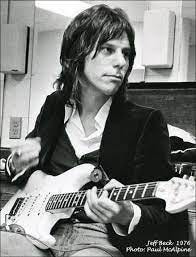
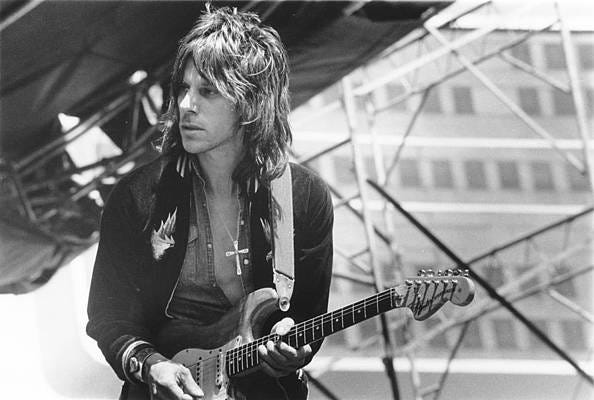

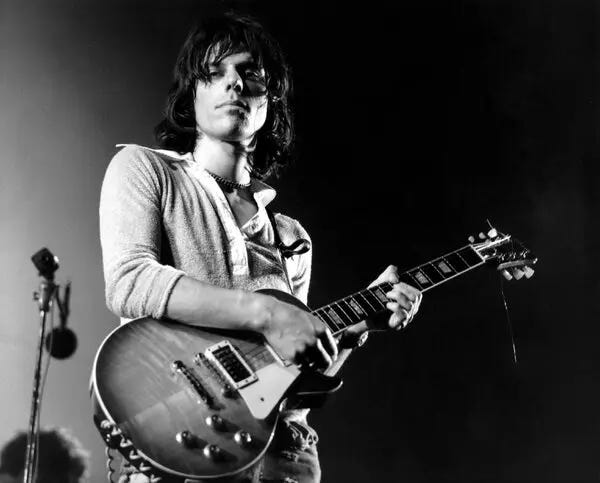
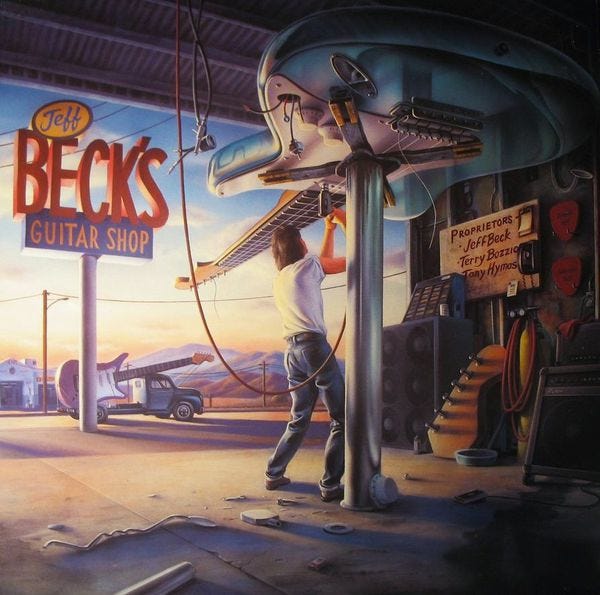

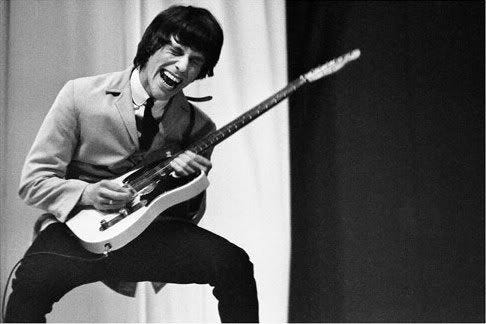
G.O.A.T. is a tall order, but JB would have to get my vote as well. He transcended styles and eras, somehow both above and part of it all. He never stopped dialing in his style - as Andee Blacksugar put it, he was 'relentlessly evolving.' As a guitar player I sound nothing like him, but along with Jimi he's been my most profound influence. I'm sad there will be no more new JB to listen to, but thankful that he left so much behind to revisit.
Thank you for this awesome article! Admittedly I needed context that you provided, to fully appreciate the genius of JB. Because he was so good at so many things (like the author!) I inadvertently pigeonholed JB as “only” having been at the pinnacle of jazz-fusion when he was so much more! Well done 👍